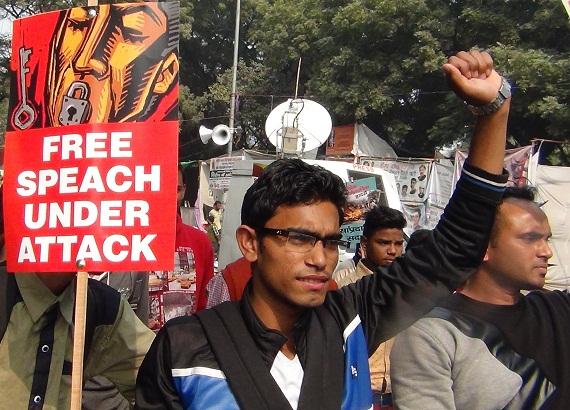HEADLINE
Student Arrests in India Spark Fierce Debate over Colonial-Era Sedition Laws
"The government is now on the defensive against what appears to be a slowly but steadily growing student movement. "
Bismillah Geelani

A police crackdown at a prestigious Indian university and the arrest of several students on charges of sedition has sparked protests from student groups across India.
The current demonstrations come just weeks after controversial protests by Dalit students, and as Bismillah Geelani reports, the government is now on the defensive against what appears to be a slowly but steadily growing student movement.
At New Delhi’s Jawaharlal Nehru University, or JNU, a professor is addressing a gathering of more than a thousand students.
Several academics, intellectuals and representatives of political parties are also here to express solidarity with the students, who have been staging a sit-in for the last two weeks.
The protests began after the arrest of student union president Kahayya Kumar, and several others, who have since been charged with sedition.
Authorities accuse the students of shouting anti-India slogans at an event commemorating the third anniversary of the controversial execution of Mohammad Afzal Guru.
The Kashmiri Muslim was convicted of involvement in the 2001 attack on India’s Parliament.
But students like Priya Devrit insist that Kumar was targeted because he didn’t allow right wing students to intervene.
“What he was essentially trying to do was protect the right to dissent and allow democratic freedoms of speech for students, irrespective of where they belong, because even the right wing says extremely hard line things,” she explains.
“But the fact is that they say it, we let them say it so if the extreme left takes a position to support self-determination movements of certain people what’s wrong? The point is why such dissent is being scuttled in JNU,” she adds.
Police also arrested a professor from Delhi University and charged him with sedition for organizing a similar event in the capital.
And a nationwide hunt is now ongoing to arrest dozens of other students believed to have participated in the JNU protest.
Home Minister Rajnath Singh says the government will not tolerate such activities.
“The government is committed to act tough against such people. Anyone chanting anti-India slogans and questioning the unity, integrity and sovereignty of the country will not be spared,” says Singh.
JNU is known as the country’s most liberal university campus.
Hindu nationalist groups like the Bharatiya Janata Party, or the BJP, have described the university as ‘a den of anti-national elements’.
But critics view the current crackdown as a form of political revenge by President Narendra Modi’s-led, BJP government.
JNU student Devrit says the government is trying to impose a narrow definition of nationalism on the country.
“The common sense in India has become that university spaces should align with a certain decorum which falls in with nationalist tendency, especially with this government in power because before this we’ve had supporters of Maoist movement,” says Devrit.
“It doesn’t mean they are anti-national, they are talking of indigenous peoples’ rights so by that definition everyone will become anti-national, it will be very few people then in a university space who you can actually straightjacket into this frozen sense of nationalism,” she continues.
Students and teachers from several other Indian and foreign universities have also come out strongly in support of the JNU.
Describing the crackdown as an assault on freedom of speech and campus autonomy.
The issue also caused uproar in the parliament for several days with the opposition strongly condemning the heavy-handed response of the authorities.
Jyotiraditya Sindia is an MP from the opposition Congress Party.
He says the government wants to silence the university students because they are highlighting the persecution of minorities.
Including the recent suicide of a Dalit student that led to nationwide protests.
Meanwhile, Hindu nationalists have made outlandish statements.
Like this one from Vikas Kumar, a member of the group Bajrang Dal.
“They should all be thrown out and they should be hanged,” he says, “They are Pakistani agents and they are being funded by the Pakistani agencies, that’s why they are indulging in anti-national activities.”
Amid the continuing protests and nationwide debate around nationalism, calls are also growing louder for the revocation of the colonial era sedition laws.
Some believe Sanjay Hegde, a senior Supreme Court lawyer, explains.
“The larger question really is about the sedition law itself,” he says, “It is almost equivalent to the blasphemy laws of Pakistan. It’s very easy to allege that somebody is anti-national and then demonize the person. It’s often an invitation to a lynch mob to take over.”
Here in the capital, critics say the laws are being used to criminalize lawful dissent.
- eng
- Bismillah Geelani
- India student movement
- India Sedition Law
Komentar
KBR percaya pembaca situs ini adalah orang-orang yang cerdas dan terpelajar. Karena itu mari kita gunakan kata-kata yang santun di dalam kolom komentar ini. Kalimat yang sopan, menjauhi prasangka SARA (suku, agama, ras dan antargolongan), pasti akan lebih didengar. Yuk, kita praktikkan!